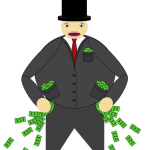Financial Psychology in the Grocery Store

Retailers make it difficult for us to make balanced financial decisions when shopping. Just think of the products piled up right in front of the checkout. Products that you actually did not want to buy but still disappear in your shopping bag. Seduction often goes hand in hand with discouragement. The retailers do this as follows:
Speak a Foreign Language
The stores deliberately make it difficult for our brain by speaking in a different language. The part of our brain that makes the decisions likes concrete amounts. At a price of EUR 4.99 our subconscious automatically scans the number 4. Your subconscious mind focuses on the first number and since the Western world reads from left to right, this is the left number. Our brain therefore automatically associates an amount of EUR 4.99 with EUR 4 and not with EUR 5. Our brain registers that you have only spent EUR 4, so that you have saved. The demand for a product even decreases if a price is increased from EUR 4.99 to EUR 5. Prices ending in EUR. . . 99 or EUR. . . , 98 also send a similar signal, namely that the products are priced at the lowest possible price.
Our Brain Likes to Keep it Concrete: Let’s Make it Complicated
An amount like EUR 6.14 is not concrete enough for our animal brain. To estimate this price, our brain takes too much energy. This is taken into account when implementing price increases. Research showed that a price increase from EUR 5.99 to EUR 6.03 was noticeable, in such a way that it was a reason to buy another, cheaper product. A price increase from EUR 6.11 to EUR 6.19, a larger increase, (!) Was not noticeable.
They also often use a step technique to trick our brain. This is especially effective when competing brands raise their prices. Instead of a direct price increase, the content of the packaging of a product of EUR 1.99 is first reduced. Some time later, a price increase from EUR to EUR 2.04 will follow. After that, the product with a smaller content is suddenly EUR 2.99.
OK in the supermarket you are in a hurry and you don’t have much time to think things through. With a large purchase you have more time and this will not happen to you!
Holiday Providers are Super Seducers
We have more time to sort out large purchases. Holiday providers use our unconscious automatic thinking in a different way. The travel companies try to seduce our animal brain. Seduce by responding to what the animal brain likes. And that is being addressed on the “experience” with beautiful pictures. Our brain likes visuals.
Internet Casanova’s speak our Brains Language!
Holiday Seducers respond to automatic thinking. They do this by:
👉Reviews or Social Evidence: If most people like this particular holiday, it will be good.
👉Scarcity: There are only a few places left. So if I don’t book that holiday now, I miss this great opportunity!
👉Going with the Herd, need to belong: So many people have booked this hotel in the last 24 hours.
👉The all-in-one approach: The success formula: Only today from EUR. . . for EUR. . .!
The holiday seducers also try to discourage our brain so that we do not let ourselves be seduced by someone else. No holiday provider has the same package as the competitor. The energy-saving brain therefore would spend too much energy in making a good comparison between the different travel organizations. So we aren’t willing to spill our energy in difficult comparation. Why wrap up and go to another for comparison when this holiday seducer is such a charmer and makes us feel good?
Read more? The FPIE (FinancialPsychology Institute Europe has contributed to the article by Judith Zijp of the MAX broadcast Network: What about it? Why do prices often end at 95 or 99 cents?
Download het artikel van Max Vandaag hier:
Hoe zit het_ Waarom eindigen prijzen vaak op 95 of 99 cent_ – MAX Vandaag
Of lees online: https://www.maxvandaag.nl/sessies/themas/consument/hoe-zit-het-waarom-eindigen-prijzen-vaak-op-95-of-99-cent/
or Email us: team@fpie.eu





